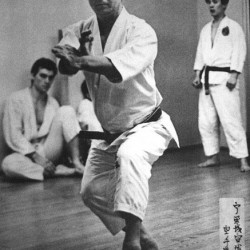In Kick Your Ass Idea #111, Ian wrote about the idea that success rarely comes without a concrete decision to become successful. He also mentioned that a lot of so-called success experts insist that lots and lots of effort (or “practice”) is also required. In Talent Is Overrated, Geoff Colvin falls squarely into the latter camp. Most “child prodigies,” he points out, had at least 10 years of intensive practice behind them. Those that qualify as masters usually have at least 20 years of practice, and it’s got to be the right kind of practice.
Almost everybody who writes about success agrees that a daily routine for getting things done is essential. In The Slight Edge, Jeff Olson discusses the importance of doing things that are “easy to do, and easy not to do.” Building on the little things, done every day, one can achieve the greatest success imaginable.
I’ve said for a long time that martial arts may be the original personal transformation system. For hundreds of years, serious people have tried to make systems for physical fitness and mental focus more effective, and one of the tools they have used is a routine set of moves that is repeated over and over. The Japanese call those routines “kata,” which can be translated as “form” or “shape.” The advantage of repeating the same set of moves thousands of times is that you can study each part in exquisite detail, and gradually refine both your understand and your ability to execute. Eventually, an ability that seems almost magical arises out of the synergy of all the excellent components joined by excellent transitions and animated by an excellent understanding of how and why they work.
You can make any aspect of your life better by figuring out a few of the most important aspects and creating a kata out of them. If you religiously perform your kata (whether in business, finances, romance, personal development, anger control, or whatever), and always try to do your best – while making your best even better – you will eventually get very, very good at it. To paraphrase certain samurai philosophers, “If a retainer truly thinks only of the welfare of his Lord without regard to personal gain or loss, wisdom which is independent of thought appears.” You can become much wiser by focusing on the most essential aspects of your mission every day.


